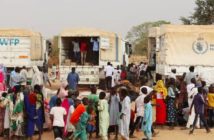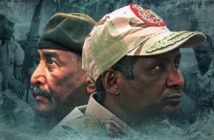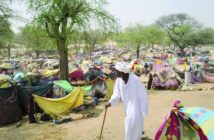In several provinces of Syria, the Free Syrian Army, there where it still exists, fights against the Islamic State. History of a revolution abandoned by the West and of a people henceforth subjected to the religious fanaticism…
One year into the Syrian uprising, we heard that the Al-Qaeda organization entered Syria – people thought that they would help the Free Syrian Army (FSA) to defeat the regime…
At the end of 2012, when the FSA drove out Assad’s army from Talbissah (10 km north of Homs), a group of Jabhat al-Nusra (about 15 men) entered Tal-Bissah. They told people that they came for the jihad against the regime represented by the Alawites, the Shiites and the Iranians.
The people and also the fighters of the FSA were pleased to receive help from them to get rid of the regime. But in fact, coordination with them never worked: the fighters of the FSA started to wonder why, since the Jabhat al-Nusra group arrived, they had never joined any attacks.
Since al-Nusra entered Tal-Bissah, their door was open for joining. Generally, Syrian people are good, sympathetic and friendly with foreigners. When the local people inquired about why al-Nusra’s members came to Syria, they told them that it was for the jihad and for the sake of Allah. They told them that they had left everything behind: their jobs, which brought them a lot of money, the peaceful and luxurious life, even their families; and had come in Syria to help their ‘brothers’. People, in Tal-Bissah, became quite friendly with them; but we quickly understood that they would destroy the FSA…
The first leader of al-Nusra in Tal-Bissah was Abu Az-Zoubeyar – many people knew him because he was a dangerous prisoner.
The regime had arrested him in Homs city (he is originally from Homs), where he murdered an Alawite because they had a misunderstanding. He was convicted and condemned to a lifelong sentence in prison, but the regime released him to join the radical groups. I saw him for five minutes when I visited their headquarters; he came into the room I was in, stayed at the door, waiting for his lackey to bring the PC. He was so different from the others, he looked intelligent… Everybody stared at him, because everybody was afraid of him.
After some weeks, in town, al-Nusra’s men started to discriminate people without beard – everybody who did not have a beard (even if it was short) would face an upsetlook and when greeting al-Nusra’s men with an “as-salam alaykom” (which means “peace be upon you”) he would receive no reply. So, I decided to grow a complete beard myself – giving up my goatee – and letting it grow long (the longer your beard, the more they like you) and went to their headquarters to visit a friend.
When I entered the place I said “as-salam alaykom” – all of them replied with smiles and I sat down with my friend, asking him some silly questions just to be able to observe and check the men.
After a while, he offered me a plate of Saudi dates… I began to go there more often, day after day, because I wanted to meet their leader – apparently a responsible man, to find out more about their motivation… They started to ask me when I would join them, but I only offered them temporary excuses. Throughout my visits, I realised that al-Nusra’s fighters were simply ignorant (they have stupidity written in their faces and their behaviour – many of them were children but looked somewhat older because of the long beards).
Finally, I met Abu Muhammad al-Sharey, their leader at that time. I told him that I wanted to talk with him alone on the roof of the building because I feared that someone might be spying on us. So he lead the way to the roof and we sat down on an old sofa and began to talk. I started with a topic, which he would like and then I turned to what I liked, telling him my story from the beginning of the Syrian uprising and how I “got lost”, which is why I had so many questions about his organization.
I asked whether he associated himself to Osama Bin Laden and Ayman al-Zawahiri – he tried to avoid the question, but as I insisted he told me that he did. I further enquired why, if he was against the United States government, he attacked the civilians on September 11. “Why!?” he replied in a surprised way; “Because we pressurise America in any way!” Then I tried to put him into a difficult position by arguing that Islam is spread over the entire world, even in America, so when attacking the US, even Muslims may be killed. But he only replied: “They will go to paradise!”
I remained strong and told him that you could not choose who gets to paradise and who doesn’t – only Allah decides! But then again he digressed. I decided to play his game and asked him why al-Nusra hates the FSA? Was it because the FSA has the wrong flag? The FSA’s flag has united people all over Syria – it is a good flag. Concerning support, I asked him who supported al-Qaeda in the past? He told me not to believe the Internet… I agreed and reasoned: “Who were the strongest powers in the world? America and Russia, correct? And al-Qaeda was fighting against Russia; so logically support did not come from Russia. Consequently, support came from the Americans… They wanted to weaken Russia in Afghanistan through you, fighting a proxy war.” He shook his head right and left and muttered angry remarks, and then said that he did not know about politics.
To make him relax a little I moved to something he liked more: I told him that I thought that Emir Khattab fought more and better against the Russians in Chechnya than Bin Laden in Afghanistan. He followed the lead and asked me whether I would trust Bin Laden, if he could prove to me that Khattab behaved in the same way as Bin Laden – killing civilians.
I played along and told him I would – then he gave me a book to read (and was convinced that I would believe the doubtful author). But it was a way for me to continue the conversation without attacking him the entire time.
It allowed me to touch upon a final subject: the killing of Alawites, men, women and children. I told him that the prophet says not to kill an old man and a child and not to cut down a tree. To that he replied that Ibn Taymiyyah (Islamic philosopher of the 13th century) said to kill them all! But I gave up (did not say that the prophet of Islam is not Ibn Taymiyyah, but Mohammad…) and stopped insisting, because I realised that instead of a mind, this man had a rock in his head. So I told him that I had to go and would see him soon. I was afraid to ever come back to their place…
The FSA fighters began to hate them, but nonetheless more and more fighters, finally, joined the al-Nusra’s group, for different reasons…
First and mainly, some of the fighters were not able to continue fighting with the FSA due to the lack of support (weapons, money, food…), which is why many fled once that their circumstances got better. Second, some of them were well educated, but they were ignored totally in the FSA groups and could not reach higher positions. Third, some people were foolish enough to join al-Nusra straightaway, because they thought that they would gain a certain degree of fame that way – most of these people were not educated and were generally ignored by the community. Fourth, some -but very few- fighters joined out of religious motives and convictions.
The civilians did not accept them because they did not trust strange people and they also knew that the regime had released some dangerous prisoners who then became leaders of al-Nusra.
Additionally, people suffered from al-Nusra’s explosive operation, which blew up a control point through which passed much of the food, the gas and the fuel for Tal-Bissah. Following that incident, the civilians came out on the streets and assembled in front of their headquarters shouting “al-Nusra, out!”. These protests were initiated by two honourable men, two sheikhs who called for a secularist state – the only two sheikhs who did not fear the violence of al-Nusra – but they came out in vain…
In June 2014, when the Islamic State (Daesh in Arabic) was announced, some fighters stayed with al-Nusra, and the others joined Daesh.
The difference between Daesh and al-Nusra is that most of Daesh’s leaders and fighters are foreigners, but al-Nusra’s are mostly Syrian.
Daesh made a lot of troubles with the leaders of the FSA and some civilians just to show its power, whilst al-Nusra settled down and kept quiet. Daesh committed many crimes, which made people hate them more than the regime and al-Nusra watched… There were numerous battles between FSA groups and Daesh, because of silly reasons invented by Daesh.
The assassinations began and all eyes turned toward Daesh; this was an incentive for the brigades of the FSA to become more or less united and to show their power. Daesh threatened the FSA’s incoming support, since it controlled the way to Turkey. When Daesh then saw the power of the FSA – even though only about half of all brigades had united – they decided to step aside. All of them went to ar-Raqqa (north-east of Syria) because they found no followers amongst our people. Their action were conducted in vain and, by the way, all people who joined Daesh after the announcement were denounced as cruel, bad men, killers and robbers.
Their leaders, who were overwhelmed by the many problems they had, gave up and fled when Daesh occupied ar-Raqqa.
As for al-Nusra, they started to think of something to prove their allegiance to the people and the FSA. About 100 men from Homs, under orders of al-Nusra (totalling about 200 fighters) helped the FSA to control Um Sharshooh (one of the biggest and most unbelievable battles in recent times – just north of Tal-Bissah). They started to help people to get back their property and rights from the oppressors, until the Alayman Brigade (the biggest and most powerful brigade in the countryside – north of Homs), led by Mohammad Addaheek, blockaded Um Sharshooh with tanks and all kind of weapons.
Their reason was to prepare an important rocket attack on Homs (with Grad rockets), but did not have the permission of the leaders of Tal-Bissah due to their increasing interferences with civilians… Not only that, but the Alayman Brigade is also considered to be discriminating – they consider people who live in Homs city better than those who live in the countryside.
Therefore, people started to think of getting rid of them (by the way, there was also discrimination inside al-Nusra).
Few days ago, they fled from Tal-Bissah because of the Americanair strikes against Daesh.
In the last weeks before they left, both Daesh and al-Nusra arranged for people to join them by paying money and getting married in exchange. But it did not work out – they took the money and the wives and fled to different areas due to the shelling and never returned… Those who remained planned on selling their weapons and disappearing…
Housam, 22 years old, left the Syrian army and came from Aleppo to Homs, his home city, but stayed in Tal-Bissah because he couldn’t enter Homs. He then joined an FSA group where I met him. He was asking me about every little thing; he really would have liked to use a camera like me, recording and taking photos everywhere – he always asked silly questions, which forced you to call him a fool.
On the 5th of March 2013 he decided to join al-Nusra, but I could not convince him to get rid of this idea, although until then I used to be able to change his mind about everything and I was surprised when he refused to follow my advice.
In my mind, he had some reasons… First, in the FSA group he did not find good enough food, which was very important for him – he had become a fat man and needed tasty nourishment. Second, he had also become greedy and to buy what he needed he required more money than the FSA could give him; so he joined al-Nusra when he heard about their internal positions and higher remuneration. At the end of that year, he asked them to help him to get married. So they gave him money to find a wife and finally, after he got what he wanted from them, he sent his wife to Idlib, where his parents live, and followed her secretly.
Now, he chats with me on Facebook and asks about the position in Tal-Bissah and his friends in the FSA…
He himself works in a barbershop – he told me that he earns 4000 Syrian Pounds a month. That means about 20 US dollars…





